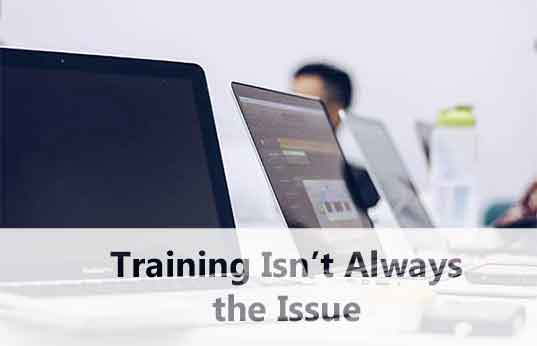Training Isn’t Always the Issue
- Posted by
- Posted in Leadership

When things go wrong in a company, the first thing people say is that it’s a “Training” issue. People aren’t being trained in the topic or skill at hand. When you ask enough questions, however, I’ve often found that it isn’t the case that people haven’t been trained, it’s that they haven’t been managed after the training.
This may not be a popular idea or opinion, but it’s harder to really figure out why an employee isn’t changing their behavior. In some cases, a person doesn’t change because they don’t really see the benefit (or risk/cost) if they do change. Let’ say the training was to follow a new process. It wasn’t explained that the reason the process is changing is due to an internal audit finding exposing the company to undue risk. So the employee forgets about the nuances of the change and the company hasn’t yet updated the Policies and Procedures document. So she falls back on the old way of doing things.
What would have made the training actually “stick?” First, always answer the “why” question. Why is the change necessary and critical to the prosperity, even the survival, of the company.
Second, determine what the penalty or cost will be for non-compliance. A simple verbal warning over and over won’t help. There should be a clear disciplinary process for non-compliance of following this or any company policy. And make sure you actually follow through when folks don’t adhere to the change.
Third, ensure systems and processes are in place to support the change. If it the change includes a system upgrade, include some kind of pop-up reminder that the procedures have changed or specifically what the employee should do differently and make sure they are required to accept the notification or click “OK” before continuing.
Let’s face it. Change is difficult. It takes reminders and follow up to ensure change lasts. Don’t assume a one-time training “event” will ensure a change. Follow up with email reminders of if you hold regular team meetings, go over the changes again during the meetings and ask if your employees have questions or recommendations for improving the change process.
Stop assuming it’s always a “Training” issue. As a business owner or leader, begin to find out if it’s really a management issue. Are they holding their employees accountable for acting on the change? Have they shared the benefits and costs with their employees? Do they themselves truly “buy-in” to the need for the change (if not, they may be unwittingly sabotaging the change effort)? Does your systems and processes truly support the change?
Change is inevitable. Let’s be smart leaders and make sure we are supporting the change in all the ways necessary for success.
May change be a positive experience for you and your team, always!
Recent Posts
- 5 Tips for Getting Undesirable Emotions Under Control
- Do What You Love- Love What You Do
- How Discovering Your Purpose Can Make You Happy
- How Gratitude Can Improve Your Business
- Find Your Passion in 5 Easy Steps
Categories
- Customer Service (3)
- Goal Setting (11)
- Inspiration (15)
- Leadership (28)
- Personal Development (43)
- Sales (3)
- Uncategorized (11)
